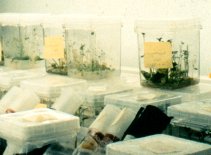 |
| In-vitro tissue culture potato explants |
Plant tissue culture is a collection of techniques used to
maintain or grow plant cells, tissues or organs under sterile conditions
on a nutrient culture medium of known composition. Plant tissue culture
is widely used to produce clones of a plant in a method known as micropropagation. Different techniques in plant tissue culture may offer certain advantages over traditional methods of propagation, including:
- The production of exact copies of plants that produce particularly good flowers, fruits, or have other desirable traits.
- To quickly produce mature plants.
- The production of multiples of plants in the absence of seeds or necessary pollinators to produce seeds.
- The regeneration of whole plants from plant cells that have been genetically modified.
- The production of plants in sterile containers that allows them to be moved with greatly reduced chances of transmitting diseases, pests, and pathogens.
- The production of plants from seeds that otherwise have very low chances of germinating and growing, i.e.: orchids and nepenthes.
- To clean particular plants of viral and other infections and to quickly multiply these plants as 'cleaned stock' for horticulture and agriculture.
Modern plant tissue culture is performed under aseptic
conditions under filtered air. Living plant materials from the
environment are naturally contaminated on their surfaces (and sometimes
interiors) with microorganisms, so surface sterilization of starting materials (explants) in chemical solutions (usually Sodium or calcium hypochlorite or mercuric chloride) is required. Mercuric chloride
is seldom used as a plant sterilant today,unless other sterilizing
agents are found to be ineffective, as it is dangerous to use, and is
difficult to dispose of. Explants are then usually placed on the surface
of a solid culture medium, but are sometimes placed directly into a
liquid medium, particularly when cell suspension cultures are desired.
Solid and liquid media are generally composed of inorganic salts plus a
few organic nutrients, vitamins and plant hormones. Solid media are prepared from liquid media with the addition of a gelling agent, usually purified agar.
source: http://en.wikipedia.org/wiki/Plant_tissue_culture
No comments:
Post a Comment